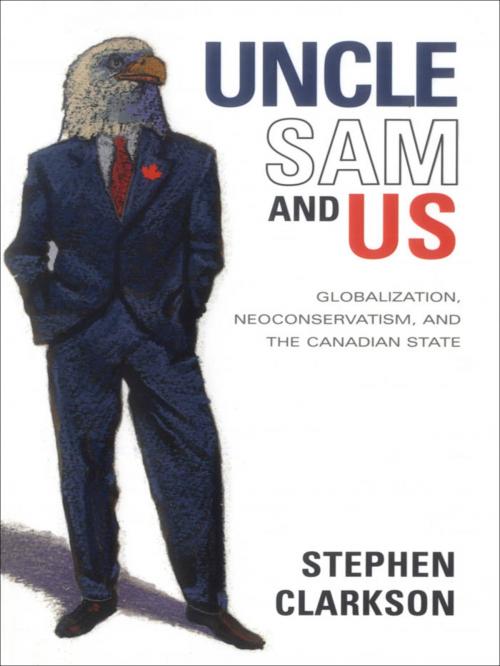Uncle Sam and Us
Globalization, Neoconservatism, and the Canadian State
Nonfiction, Social & Cultural Studies, Political Science, Politics, Economic Policy, International, International Relations| Author: | Stephen Clarkson | ISBN: | 9781442690899 |
| Publisher: | University of Toronto Press, Scholarly Publishing Division | Publication: | September 28, 2002 |
| Imprint: | Language: | English |
| Author: | Stephen Clarkson |
| ISBN: | 9781442690899 |
| Publisher: | University of Toronto Press, Scholarly Publishing Division |
| Publication: | September 28, 2002 |
| Imprint: | |
| Language: | English |
Between them, Brian Mulroney and Jean Chrétien radically altered the structure and functions of the federal government, first by signing and implementing major trade liberalization projects, and then by cutting back the size of their governments' budgets and the scope of their policies. Uncle Sam and Us analyzes the Mulroney-Chrétien era's impact on Canadian governance through two related factors, globalization from without and neoconservatism from within.
Stephen Clarkson begins his study by conceptualizing the present Canadian state as a five-tiered, nested system stretching from the municipal and provincial levels, through the federal government, and on to the new continental and global spheres of governance: in effect, he argues, the North American Free Trade Agreement and the World Trade Organization have added a 'supraconstitution' to Canada's existing institutions. His analysis concerns the changes that have occurred not just in the federal government, but in provincial and municipal governance as well. The impact of globalization and neoconservatism is examined extensively in the second part of Clarkson's study, which examines how the functions of the Canadian state have altered. Clarkson addresses the changes in a number of policy areas such as macro and monetary policy, regulatory, industrial, and trade policy, as well as social, labour, environmental, cultural, and foreign policy.
In linking external forces and internal factors in his analysis, Clarkson brings together separate aspects of the Canadian state into a comprehensive understanding of the current Canadian political climate. He combines a global knowledge of the international political economy with a micro concern for detailed analyses of policy issues, and concludes that the responsibility for Canada's predicament lies less with external forces, than with Canadians and the governments they elected. He ends with a hopeful look into the future, pointing towards a realization of the shortcomings of neoconservative globalization, and the expectation of a new governing paradigm.
Co-published with Woodrow Wilson Center Press
Between them, Brian Mulroney and Jean Chrétien radically altered the structure and functions of the federal government, first by signing and implementing major trade liberalization projects, and then by cutting back the size of their governments' budgets and the scope of their policies. Uncle Sam and Us analyzes the Mulroney-Chrétien era's impact on Canadian governance through two related factors, globalization from without and neoconservatism from within.
Stephen Clarkson begins his study by conceptualizing the present Canadian state as a five-tiered, nested system stretching from the municipal and provincial levels, through the federal government, and on to the new continental and global spheres of governance: in effect, he argues, the North American Free Trade Agreement and the World Trade Organization have added a 'supraconstitution' to Canada's existing institutions. His analysis concerns the changes that have occurred not just in the federal government, but in provincial and municipal governance as well. The impact of globalization and neoconservatism is examined extensively in the second part of Clarkson's study, which examines how the functions of the Canadian state have altered. Clarkson addresses the changes in a number of policy areas such as macro and monetary policy, regulatory, industrial, and trade policy, as well as social, labour, environmental, cultural, and foreign policy.
In linking external forces and internal factors in his analysis, Clarkson brings together separate aspects of the Canadian state into a comprehensive understanding of the current Canadian political climate. He combines a global knowledge of the international political economy with a micro concern for detailed analyses of policy issues, and concludes that the responsibility for Canada's predicament lies less with external forces, than with Canadians and the governments they elected. He ends with a hopeful look into the future, pointing towards a realization of the shortcomings of neoconservative globalization, and the expectation of a new governing paradigm.
Co-published with Woodrow Wilson Center Press















